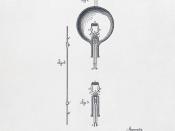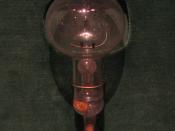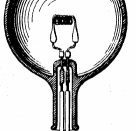Electricity is important in our everyday lives. It is essential for almost everything in our modern world. The knowledge learned in the past about electricity enabled such things as engines, telephones, radios, computers, and much, much more.
As early as 600 B.C., the Greeks were already studying electricity. They noticed that if you rubbed a piece of amber with fur, it had a charge with the ability to attract small objects. Many years later, in the 16th Century, William Gilbert discovered many other objects had this same ability, and that these charges had two different kinds of electrical charge. He learned that electricity repels the same kind, and attracts the opposite kind.
It wasn't until 1747 when Benjamin Franklin in America and William Watson in England both discovered that all materials have an "electrical fluid" that cannot be created or destroyed. Rubbing two objects does not create electricity, but just transfers electricity from one object to another.
Both of these men discovered that the total amount of electricity in an insulated area is constant throughout the area.
Franklin's major experiment on lightening happened in 1752. During a thunderstorm, he flew a kite with a metal tip. Attached to the string holding the kite was a metal key. Franklin could put his hand near the key during the lightening and draw sparks. He concluded that the lightening was from an electrical discharge. Later, two other people attempted this same experiment but died from the electricity.
Luigi Galvani was another scientist who started working on electrical experiments. He fastened the legs of a dead frog to a copper hook, hung it over an iron railing and discovered the frog's legs twitched. He determined the frog has electricity and it was released when it touched the metal. Unfortunately, he figured it was a...



Good, but...
It is a fairly good essay, but I would suggest that you try to search for other very important contributors to the developments of electricity. You did not mention Nikola Tesla. He invented the telephone repeater, induction motor, wireless communication, radio, fluorescent lights, and more than 700 other patents (more details on: http://www.neuronet.pitt.edu/~bogdan/tesla/).
0 out of 0 people found this comment useful.